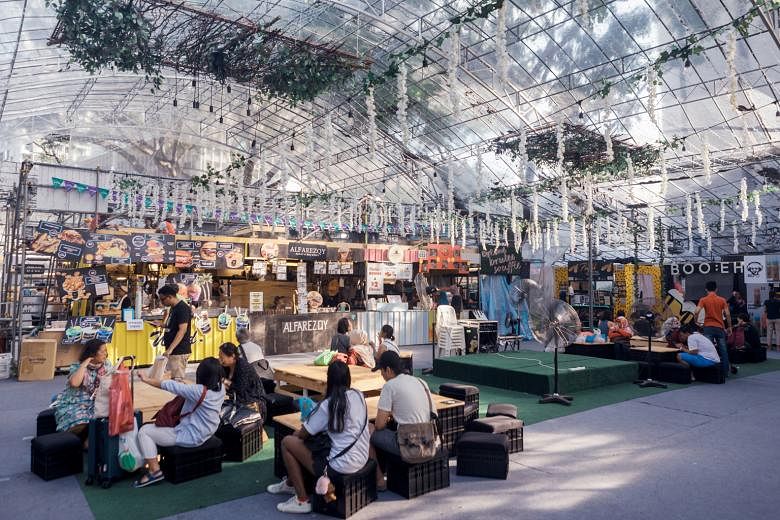Despite the closure of Ramadan bazaars due to circuit breaker measures, Malay cuisine stall owner Zuliza Zulkifli has been busy.
Her business profits this year have exceeded last year's haul for the same period and orders for today are closed since she is fully booked.
The 42-year-old, who runs Nasi Ambeng Asli Jurong West, has turned to online platforms to market her wares during the Ramadan period. Much like other merchants, she relies on sales during the festivities for a seasonal windfall.
Her business has reaped rewards from the move, especially since she no longer has to fork out $10,000 to $12,000 to set up a physical stall at Ramadan bazaars, something she had routinely done in past years.
"It has been so good for my business. I have sold out on quite a few days and we are making more money than before. My customers used to live mostly in the west, but now they come from areas such as Tampines and Punggol," she said.
Still, she misses mingling with other stall owners and artists at physical bazaars, as well as the smell of food wafting through the air.
Noting that this does not mean physical stalls are obsolete and that her increased sales could be the result of exceptional circumstances this year, she added: "Many people could be worried about leaving the house and so are ordering food to be delivered. I'll probably still have a stall next year, but could make my online presence bigger."
The launch of several virtual Ramadan bazaars has thrown a much-needed lifeline to many home-based retailers who rely on Ramadan sales. The online bazaars allow businesses to list their contact details and goods on their sites, connecting them with customers at a time when face-to-face sales are no longer possible during the coronavirus pandemic.
Among these are platforms like B. Halal and Gobaza.sg, and BazaarRia, a platform jointly launched by DBS Bank and its client Mi Planets on Monday, which is already being used by over 800 merchants.
These platforms often help businesses set up their listings so that they can make the best use of what is available. Services are usually free, although on some platforms merchants can pay to secure a space for advertisements.
Madam Normah Abas, owner of floral decor business ZN Exclusive Creation, said sales dropped to zero for a spell of time during the circuit breaker period. She then signed up on BazaarRia - with the help of DBS - and has seen "a steady pickup".
Now, she is even considering closing her physical shop after the outbreak is over to save on rental costs.
"We have always been open to going online but just did not know how to," she said.
"Going online has helped us a lot by enabling us to still earn money."
She had estimated a 70 per cent drop in sales before the digital move but is now hopeful of a better showing.
Listing platforms have pulled out all the stops to give merchants a boost and recapture the conviviality of Hari Raya Aidilfitri celebrations. Gobaza.sg has, for instance, held "go live" sessions where vendors are interviewed to give them a chance to promote their products.
BazaarRia has sought to innovate via its payment system, integrating it with DBS' mobile-based QR payment collection method so people can pay by scanning a PayNow QR code using their mobile phones.
A similar People's Association initiative, GeylangBazaar.Online, provides delivery to customers.
Still, it remains to be seen if such measures are enough to help all home-based retailers break even.
Ms Hazirah Abdul Halim, owner of Haifa Areta, a home-based Hari Raya Aidilfitri apparel business, said her sales have dropped by half during the pandemic. This is despite her operations being primarily based online and despite her signing up on multiple new platforms.
"My main challenge was not in shifting (my operations to digital), but rather to juggle, upkeep and adapt to multiple new platforms.
"With a bit of a boost, merchants like myself hope to maintain our businesses and break even with the profits earned," she said.



